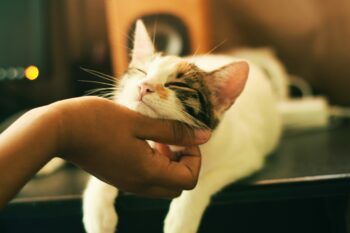We cat lovers know that cats are exquisitely intelligent animals. But what, exactly, does intelligence imply? Too often we carry around a stereotypical view in which dogs are trained and cats are… well, pampered. But training cats can be useful and even fun, both for us and for our fabulous felines.
What kinds of tasks can cats learn? Almost anything, as long as they are physically capable and they are motivated. Each animal can learn to do what it was designed, by nature and evolution, to do. For example, cats are agile creatures that and learn to jump onto high surfaces. No matter how appealing the reward, however, dogs cannot jump as high, even if they wanted to. A cat may be strongly motivated to jump onto kitchen counters when food is occasionally found there. Dogs, on the other hand, are more likely than cats to lie down in front of their higher-ranking owners, and can therefore be trained easily to lie down on command. (Cats are certainly social animals, but they do not form highly structured dominance hierarchies the way dogs do.) If you are determined to teach your cat to lie down on command, it can be done–but the reward had better be exceptional, from a feline point of view.
To teach an animal any task, the specific behavior must be reinforced, or rewarded. Cats will usually work for food, if the food is appetizing. Experiment with your own cat to find an appealing food reward. What has compelled her to jump up onto your dinner table in the past? Possibilities might include the cat’s own dry kibble (if she is a ravenous eater), popcorn, bits of cheese, pitted olives, bits of tuna or even a pinch of catnip.
It is most efficient to teach your cat an association between the food and a quick sound, such as a clicker. Using a clicker eliminates the need for perfect timing of the food reward. Once such an association is learned, the clicker (or bell, or other sound) can be used to quickly reinforce a desired behavior while the cat is then slowly offered, and accepts, the food reward. You start the association by simply clicking the clicker and offering the cat a treat. Click, treat and repeat. After a few repetitions, your cat will understand that sound of the clicker means “food is coming.”
A simple rule of training is that newly learned tasks are rewarded each time the task is performed correctly, and then, once learned, rewarded only randomly. There is no need to have food constantly available. As long as it is periodically offered to her, your star performer will continue to do what you’ve asked.
So what kinds of behaviors or tasks might you teach your cat? The first thing that comes to mind is using the litter box for elimination. Luckily, urinating and defecating in diggable material comes naturally to most cats and, therefore, does not need to be trained. However, cats with the unfortunate habit of urinating or defecating outside the litter box may benefit from behavior modification, or training, to use the litter box instead. If your cat is habitually eliminating outside the litter box, try bringing her gently to the box once or twice daily and, if she then eliminates inside it, rewarding her for her efforts. At the same time, restrict her from the undesired area she has been using, or cover it temporarily with thick vinyl. If the inappropriate urination or defecation continues, ask your veterinarian for assistance with this sometimes complicated (and very common) behavior problem.
Cats are also quick to learn tricks such as fetching a toy, jumping through a hoop or simply sitting on command. Training can be useful, however, for reasons other than simple fun. Even young children enjoy having a “vocabulary” with their feline pets, and such purposeful activity is better for the cat than simply being carried from place to place. Playfully aggressive cats or those who exhibit status-related irritable behavior also benefit from learning tricks–again, it provides a way to interact with humans that distracts the cat from her conflicted social behavior. Cats learn quickly, for example, that their humans will accept only appropriate behavior (such as sitting) at certain times. Humans learn quickly, as well, that reward-based training results in much less irritability or play-biting than prolonged petting might.
Is learning tricks, in general, a fun pastime for your cat? Think of it this way: There is little likelihood that she would humor you if it weren’t.







